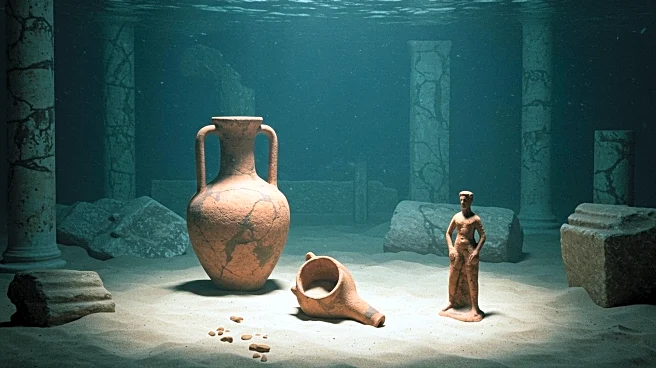What is the story about?
What's Happening?
Egyptian authorities have successfully retrieved artefacts from a submerged site off the coast of Alexandria, believed to be part of the ancient city of Canopus. This site, located in Abu Qir Bay, includes buildings, statues, and an ancient dock dating back over 2,000 years. The city was a significant center during the Ptolemaic dynasty and the Roman empire. Over time, natural disasters such as earthquakes and rising sea levels led to the submersion of Canopus and the nearby port of Heracleion. The retrieval process involved cranes lifting statues from the depths, assisted by divers. Notable finds include limestone buildings, statues of royal figures, sphinxes, and a merchant ship, all dating back to the Ptolemaic and Roman eras.
Why It's Important?
The retrieval of artefacts from the sunken city of Canopus is significant for both historical and cultural reasons. It provides insights into ancient civilizations that thrived in Egypt, contributing to our understanding of their architectural, social, and economic structures. The artefacts offer a glimpse into the past, showcasing the craftsmanship and artistry of the era. Additionally, this discovery highlights the ongoing challenges posed by climate change and rising sea levels, which continue to threaten coastal cities like Alexandria. Preserving these artefacts is crucial for maintaining Egypt's cultural heritage and promoting tourism, which is a vital part of the country's economy.
What's Next?
The Egyptian Ministry of Tourism and Antiquities plans to continue exploring the underwater site, although retrieval will be limited to specific materials due to strict criteria. The remaining artefacts will stay submerged as part of Egypt's sunken heritage. Future efforts may focus on preserving the site and mitigating the impact of rising sea levels on Alexandria. The city faces significant risks from climate change, with projections indicating that a third of Alexandria could be underwater or uninhabitable by 2050. This situation calls for urgent action to protect both the city's residents and its historical treasures.
Beyond the Headlines
The discovery of Canopus raises important questions about the preservation of underwater cultural heritage. Ethical considerations must be addressed regarding the retrieval and display of artefacts, balancing the need for public access with the protection of historical sites. Additionally, the threat of climate change to Alexandria underscores the need for global cooperation in addressing environmental challenges. The situation serves as a reminder of the interconnectedness of cultural preservation and environmental sustainability, highlighting the importance of integrating these efforts into broader policy frameworks.
















